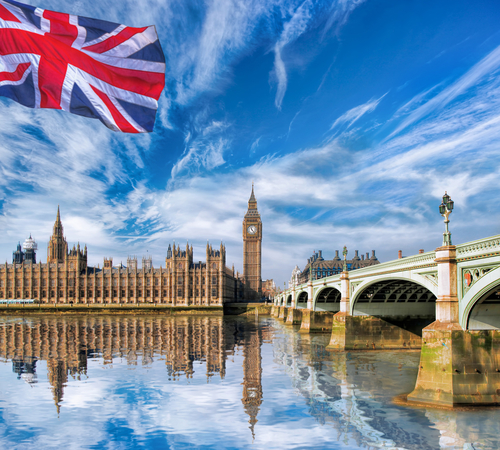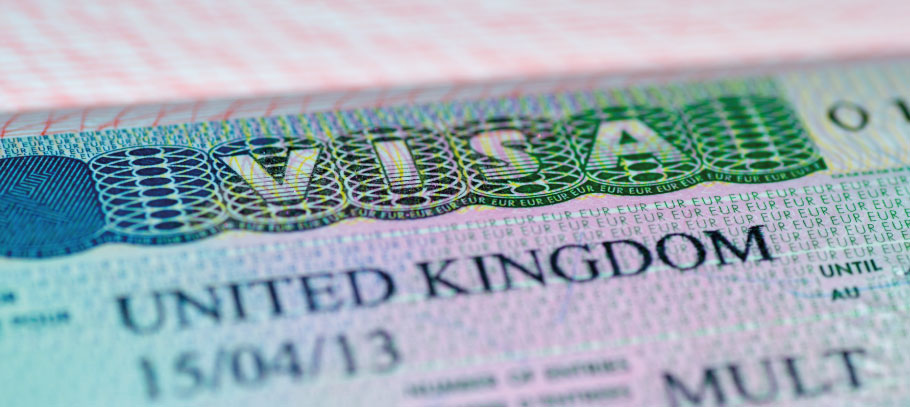All international students who want to study in the UK are required to get a student visa (Tier 4). This type of visa is only available to full-time university students pursuing a degree in the UK, and not short-term or language courses.
Anyone who is planning to study in UK is required to have a visa in order to stay in the country for an extended period of time. Immigration requirements for UK (and the United Kingdom as a whole) are determined by your nationality and the country(ies) that you have citizenship in. This part of the guide will focus on giving you a general idea of the guidelines for getting a visa for study in UK.
How to apply for a student visa in UK?
The application for a student visa in UK can be carried online, by post or in person. Note that you can apply online only from outside of the UK, Channel Islands and the Isle of Man (except North Korea). Those who are residing in UK at the time of application must apply in person or by post.
What documents do I need?
Always have in mind that visa restrictions and requirements in the UK change regularly. Therefore, you must always check the official visa policy guidelines before initiating an application.
Currently, your student visa application requirements in UK change based on your citizenship and the type of visa you’re applying for. Depending on your purpose of visit in the UK whether it is for health issues, studying, familiar union and so forth, you need to seek a proper visa and particular visa requirements.
If you want to find out what are the requirements for different UK visa types, check visaguide.world.
Frequently Asked Questions About UK Student Visa
When can I apply?
You can apply for your student visa in UK 3 months before your course starts. Once you submit a university application you’ll receive (or you can request it) a Confirmation of Acceptance for Studies. This document will entitle you as an admitted student in UK and therefore you’re eligible to seek a visa. Use the CAS number to support your student visa application form.
Can I work while studying in UK?
Yes, you can. Under current legal regulations in the UK you are allowed to find a part-time job while studying. As a government-sponsored international student who attends a course for 6 months or longer, you’re allowed to work up to 20 hours per week. However, make sure your university is listed on the list of recognized higher education providers in the UK. At this link is the full list of these recognized bodies.
Can I bring my relatives in UK with my student visa?
You can, but there are some restrictions and exemptions applied you must be aware of. As a government-sponsored student, you can bring in UK your dependents if you’re enrolled in an undergraduate course longer than 6 months or in a postgraduate course longer than 12 months at a recognized university.
First, you need to know what is regarded as a dependent. Your spouse/wife and children are considered as your Tier 4 dependents. Other relatives are not.
Next, your dependent must prove good financial resources in order to be given the right to come in UK as your dependent. The amount of money required in this case can be held by you or by your dependent.
Your dependent can work in UK under these circumstances
-
You’re attending an undergraduate degree course longer than 6 months or a postgraduate degree course longer than 12 months.
-
A newly introduced rule in the UK states that those dependents who submit an immigration application on or after 06 July 2018 will be allowed to work even if your course is longer 9 months or longer.
How much does it cost to get a student visa in UK?
Naturally, applying for a UK student visa carries a certain fee which may depend on your nationality and the type of visa you’re willing to get. Furthermore, the student visa fee scheme changes from time to time so you must always check the official sources.
If you apply from outside the UK for a Tier 4 Student visa you will need to pay £335. If you’re applying from within the UK the following prices may apply to you
-
Standard service – £457
-
Priority service – £916
-
Premium service – £1047
Note: A charge for your membership at the Immigration Health Service is included.
At this link, the UK’s governmental site shows the exact cost of applying for a visa in UK, including student visas. Just select your country from where you’re applying, the type of visa you want to get and the purpose of your visit in UK and there it is.
How to get a work visa after studies in UK
If you’re thinking to remain in the UK for a certain period after getting your degree there are various options for you. As long as your student visa is valid you’re allowed to find a full-time job and work in the UK. After your visa expires, you must contact the Home Office if you want to extend its validity.
However, there are some restrictions, you must be aware of. These are the types of job you’re not allowed to seek
-
A permanent full-time job
-
Self-employed or Freelancer
-
A doctor in Training, Coach, sportsperson or entertainer (except in a certified Foundation Program)
Below are given some of the ways you can extend the duration of your staying in UK by seeking a proper visa.
Tier 4 Doctorate Extension Scheme – Students that are at the final stage of completing their PhD in UK and are thinking to find a job or establish a business can seek an extension for up to 12 months. To get this visa a sponsorship from your university is required.
Tier 2 (General) – The most common route to immigrate and work in the UK is by taking a Tier 2 (General) visa. You can only seek this visa if there’s a Tier 2 licensed employer who’s offering you a job. This type of visa is valid for up to 5 years.
Tier 1 Graduate Entrepreneur – If you have an idea to set a business in UK, you can get a Tier 1 visa. You don’t need a sponsorship for this visa, but an approval from the University or UK Trade and Investment is required. Its validity lasts for 12 months and after that, you can ask for another extension of 12 months.
UK Ancestry – If your grandparent was born in UK and you want to work in UK you can get such a visa. Its validity lasts for 5 years.
As the current rules state, your University must inform the Home Office if it’s aware that you’re not respecting the conditions and terms of your Tier 4 visa.
The European Union, European Economic Area (EEA) or Swiss Citizens:
If you have a passport from one of the countries below, then you do not need a visa in order to study in the UK. This also includes those who have dual nationalities (two or more) who use an EEA/EU/Swiss Passport in order to get into the country.
-
Austria
-
Belgium
-
Bulgaria
-
Croatia
-
Republic of Cyprus
-
Czech Republic
-
Denmark
-
Estonia
-
Finland
-
France
-
Germany
-
Greece
-
Hungary
-
Iceland
-
Ireland
-
Italy
-
Latvia
-
Liechtenstein
-
Lithuania
-
Luxembourg
-
Malta
-
Netherlands
-
Norway
-
Poland
-
Portugal
-
Romania
-
Slovakia
-
Slovenia
-
Spain
-
Sweden
Non-EU/EEA/Swiss nationals
If you are looking to come to UK to study abroad, you will need a visa. There are two categories of nationalities that the UK Border Control has, and you will have to determine which you fall under before you can know how to apply. Your visa application will also be based on what you’re studying and how long you plan to stay in UK.
Visa Nationals:
Visa nationals are those who are citizens of the countries that are included in this list (which can also be found on the UKBA website).
-
Afghanistan
-
Albania
-
Algeria
-
Angola
-
Armenia
-
Azerbaijan
-
Bahrain
-
Bangladesh
-
Belarus
-
Benin
-
Bhutan
-
Bolivia
-
Bosnia Herzegovina
-
Burkina Faso
-
Burma
-
Burundi
-
Cambodia
-
Cameroon
-
Cape Verde
-
Central African Republic
-
Chad
-
People’s Republic of China (unless they hold a passport issued by Hong Kong Special Administrative Region or Macao Special Administrative Region)
-
Colombia
-
Comoros
-
Congo
-
Cuba
-
Democratic Republic of the Congo
-
Djibouti
-
Dominican Republic
-
Ecuador
-
Egypt
-
Equatorial Guinea
-
Eritrea
-
Ethiopia
-
Fiji
-
Gabon
-
Gambia
-
Georgia
-
Ghana
-
Guinea
-
Guinea Bissau
-
Guyana
-
Haiti
-
India
-
Indonesia
-
Iran
-
Iraq
-
Ivory Coast
-
Jamaica
-
Jordan
-
Kazakhstan
-
Kenya
-
Korea (North)
-
Kosovo
-
Kuwait
-
Kyrgyzstan
-
Laos
-
Lebanon
-
Lesotho
-
Liberia
-
Libya
-
Macedonia
-
Madagascar
-
Malawi
-
Mali
-
Mauritania
-
Moldova
-
Mongolia
-
Montenegro
-
Morocco
-
Mozambique
-
Nepal
-
Niger
-
Nigeria
-
Oman
-
Pakistan
-
Palestinian Territories
-
Peru
-
Philippines
-
Qatar
-
Republic of South Sudan
-
Republic of Sudan
-
Russia
-
Rwanda
-
Sao Tome e Principe
-
Saudi Arabia
-
Senegal
-
Serbia
-
Sierra Leone
-
Somalia
-
South Africa
-
Sri Lanka
-
Sudan
-
Surinam
-
Swaziland
-
Syria
-
Taiwan (unless they hold a Taiwan passport which includes the number of the identification card issued by the competent authority in Taiwan)
-
Tajikistan
-
Tanzania
-
Thailand
-
Togo
-
Tunisia
-
Turkey
-
Turkmenistan
-
Uganda
-
Ukraine
-
United Arab Emirates
-
Uzbekistan
-
Vatican City
-
Venezuela (unless they hold a Venezuelan passport which contains biometric information held in an electronic chip)
-
Vietnam
-
Yemen
-
Zambia
-
Zimbabwe
-
The territories formerly comprising the socialist Federal Republic of Yugoslavia
If the country you are a citizen of is on this list, here is what you have to do in order to study in UK.
-
You have to obtain your visa prior to arriving in UK.
-
If you plan to be in the country for 6 months or more or you want to work in UK (either as an unpaid internship or in order to make a living), you must obtain what is called a Tier 4 (general) student visa.
-
If you are not working and you are staying for less than 6 months, then you may get either a student visitor visa or a Tier 4 (General) student visa.
Non-visa Nationals:
If your country of citizenship is not on either one of the above lists (visa national or EU/EEA/Swiss), then you are considered a non-visa national. Here is what you must do in order to study in UK.
-
You have to obtain your visa prior to arriving in UK.
-
If you plan to be in the country for 6 months or more, or you want to work in UK (either as an unpaid internship or in order to make a living), you must obtain what is called a Tier 4 (general) student visa.
-
If you are in the country for less than 6 months, and are not working, then you can apply for entry to the UK as a student visitor.
Applying to be a student overseas can be a lot of work, but the agency at your college or university (or the one you are attending in UK) can assist you with everything that you may need.
If you want to check and make sure if you need a visa, check out the UK Visa Guide webpage. All the information that you will need can be found there.

Studying in the UK comes at a very high price. Some students may dream to get a British degree, but still, seek to get the very best deal in terms of money. In the UK there’s a countless number of Universities each with different tuition fees and other expenses, and to a certain degree, everyone seeking an affordable option will likely find one. And what’s even better, this is not done at the cost of your degree.
Following a governmental decision that came into power in 2017, British universities are allowed to charge home students with tuition fees up to £9,250. At the same time, universities independently set their tuitions’ policy for international scholars.
Fairly, this is a high amount of money and for many may not be affordable. Knowing that the UK is one of the most expensive countries to live, imagine taking into consideration other expenses that come into play in your life as an international student. For most of us, this would turn the studying in the UK on an impossible mission.
There are universities in the UK, which charge the same minimum £9,250 for international students as for the home students.
Note: Universities are enlisted according to their undergraduate’s course tuition fees
List of the Cheapest Universities in UK for International Students:
University of Stirling, Stirling – £13,650
Founded in 1967 the University of Stirling has built its reputation upon excellence and innovation. For its prospective students, it offers a high-quality education and a wide spectrum of study programs. Despite being a highly reputed, the University of Stirling is definitely one of the cheapest universities in the UK. Undergraduate students at this university will be charged £12,140 in a Classroom-based course and £14,460 for a Laboratory-based course. Tuition fees at the postgraduate level are divided into bands (A, B, C*, D) and vary between £13,650 and £18,970.
Queen Margaret University, Musselburgh, East Lothian – £13,000
The campus of the Queen Margaret University is located just six minutes by train far from the wonderful city of Edinburgh, in the seaside town of Musselburgh. For those who love the sun, this city is a place to be, because it is the sunniest area in Scotland. At this university, you’ll find a wide range of study programs. The tuition it carries is fairly low in comparison to the British standard. For the upcoming academic year, 2018/19 international students at the undergraduate level will be charged with tuition fees between £12,500 and £13,500, while those at the postgraduate level will be charged much less.
Southampton Solent University – £12,500
The Southampton Solent University study programs are sought after by numerous international scholars. Its student population consists of students coming from almost 100 nationalities. The followings are tuition fees for international students in the 2018/19 academic year
Full-time undergraduate fees:
- Bachelor’s degree £12,500
- Foundation Year/Certificate £11,000
- Higher National Diplomas/Certificates (HND/HNC) £11,000 (additional registration fee may apply)
Full-time postgraduate fees:
- MA: £12,500
- MSc: £13,500
- MBA: £15,000
- Full-time postgraduate research: £12,500
University of West London – £12,000
The University of West London enjoys a worldwide reputation as an excellent university. As such qualitative university, in this year’s Guardian University Guide 2019 it is ranked 50th. Its outstanding education and research are carried out on its modern campus that consists of brilliant facilities where everyone can improve. However, with its fairly low tuition fees, the University of West London is one of the cheapest Universities in the UK. In most cases, the tuition fee for the 2018/19 academic year at this university is £12,000.
Leeds Becket University – £12,000
Based on the biggest financial district aside from London, and the vibrant city of Leeds, this university defines itself as a university with clear educational ambitions. Their goal is to equip scholars with an exceptional level of education and skills that will guide their way toward the future. The University runs a number of partnerships with different organizations and companies around to ensure its students get the best opportunities to find a good job after completing their studies. Currently, the university boasts over 28,000 students coming from almost 100 countries of the world. In addition, the Leeds Becket University has some of the lowest tuition fees among all British universities. At this university, you’ll have to pay as follows
- Undergraduate (most courses) – £12,000
- Postgraduate (most courses) – £11,500 – £12,500
- Research – £12,000 (may change in 2019/20)
Teeside University – £11,825
The reputation of the Teeside University is both nationally and internationally recognized. Through its rich scheme of study programs and high-quality teaching and research, the university guarantees to offers its student an exceptional education. Its reasonable tuition fees make this university still more attractive to international students. The 2018/19 academic year for an international foundation program will cost £9,750. For a full-time undergraduate course, you will have to pay £11,825 per an academic year. At the postgraduate level, there is much diverse tuition fee scheme. It starts at £5,875 in a part-time distance learning research degree and it ranges up to £17,000 in the Master of Business Administration (MBA).
Wrexham Glyndwr University – £11,750
Established in 2008, the Wrexham Glyndwr University is one of the youngest universities in the whole UK. But, regardless of its very short history, this university is highly valued for its quality of education. Besides, it is a university easily affordable because it carries considerably low tuition fees for international students. The tuition fees for the 2018/19 academic year at the University of Glyndwr will be as follows:
- Undergraduate – £11,750
- Postgraduate – £12,500
University of Bedfordshire – £11,500
The University of Bedfordshire established in 2006, as a blending of the University of Luton and De Montfort’s University, two Bedford’s University campuses. The institution enjoys a global appealing, hosting more than 20,000 students coming from over 120 countries. Besides being this highly reputed and valued university, it carries affordable tuition fees for the international students. According to their actual tuition fee policy, international undergraduate students will have to pay £11,500 for a BA or BSc degree program, £12,000 for an MA/MSc degree program and £12,500 for an MBA degree program.
University of Cumbria – £10,500
The University of Cumbria opened its doors just ten years ago and today it counts 10,000 students. Their clear long-term aim is to prepare its students to be able to give their fullest potential and seek a successful career. Although it’s such a qualitative university, the Cumbria University is one of the cheapest in the UK. The tuition fees it charges for international students, changes depending on the type and the academic level of your course. At the undergraduate level, an international student will have to pay between £1,554 for a Presessional English (6 weeks) to £15,500 for BA (Hons) Social Work and Health Pre-registration Program. At the postgraduate level, the tuition fees may range from £3,500 (Young people Community and Society) up to £15,500 (Nuclear Security Management, Ecosystem Services Evaluation).
University of Chester – £9,250
The University of Chester opened its doors in the far year 1839. Throughout this long history, the university has created a unique identity of a quality higher education institution. Their aim is to prepare students to gain the necessary skills which later will help them build their academic career and help their local communities. A degree at this university comes at a very affordable price. Depending on the type and the level of the course of your choice, these are the tuition fees you’d expect at the University of Chester as an international student
- International Foundation Program – £9,250
- Bachelor’s degree including Foundation – £9,250 Year 1 – £11,950 Years 2-4
- Undergraduate – £11,950
- UG Pre-Reg Nursing Pathways – £9,250 + £3,000 placement
- Postgraduate – £12,000
- MBA – £12,250
- Research Degrees – MRes/MPhil/PhD (Lab-based) – £16,228
- Research Degrees – MRes/MPhil/PhD (Classroom-based) – £16,635
The UK is once again emerging as a preferred study destination among international students
It’s more than three years now since the UK voted to opt-out of European Union (EU), Brexit has been a dominant topic of discussion among the politicians forcing crucial issues like higher education to slip through the gaps. With the deadline for the withdrawal now extended till 31 January 2020, the uncertainty still prevails around whether Brexit will have any effect over the academic aspirations of international students willing to study in the UK.
Brexit: Scenario before and after for international students
The EU follows relaxed movement rules to enable easier immigration to all European countries, thus streamlining and easing the process of studying abroad for both UK and EU students alike. Since the residents of EU nations are usually able to study in other EU nations as ‘home students’, their fees are generally lower or non-existent in comparison to the fees charged to international students. Post-Brexit plans will not only bring bad news for UK students willing to study in mainland Europe but will also affect the EU students. Proposals from Britain’s education ministry have stated that from 2021 the UK may start charging overseas EU students the same fees as charged to the other international students. This means that EU students would have to pay somewhere between £10,000 and £35,000 a year to attend a university in England.
Moreover, Britain’s exit from the EU can possibly affect the country’s reputation as one of the top study abroad destinations. It can complicate the student visa process, making it more difficult for international graduates to secure jobs in the country due to fluctuations in work visa policies.
There is also a possibility of getting no scholarships in the case of certain universities in the UK. While Brexit may not impact the UK based scholarships like Commonwealth or Great, it might hinder the probabilities of international students planning to participate in EU-based grant opportunities through programmes like Erasmus+.
Despite all these apprehensions, a recent study by the GMAT council reported that international students are still keen to study business in the UK. In fact, Brexit is expected to bring a considerable positive impact on Nepali students interested in pursuing higher education in the UK, especially those willing to register for the postgraduate programmes at UK universities. With the British government revealing its ambitious immigration plan underlining the need for skilled professionals in the UK economy, the admission of Nepalese students and other migrants from the non-EU regions will hugely benefit from such a demand and favourable immigration policies.
Changing policies in the UK might be a boon for International Students
A new set of immigration rules drawn by the UK, which will come into effect from 2021 will work in favour of non-EU foreign students. As per the new rules, international students will be permitted to stay back in the UK for 2 years to look for suitable employment after completing their graduate and postgraduate studies. Meanwhile, for Ph.D. students, the post-study work period will be stretched to one year. This will open up multiple opportunities for foreign students, who can now seamlessly switch to a skilled work visa once they find a job after the completion of their studies.
Earlier, the then Home Secretary Theresa May had eliminated the post-study work visa as a part of the country’s immigration crackdown in 2012, which was discouraging students to apply in UK universities. In spite of housing the world capital of higher education (London) and offering world-class education, the UK was witnessing a low inflow of foreign students. The present government’s restoration of its two-year post-study work visa policy will offer a fair game for the international students to secure a place at a prestigious UK university.
That said, the UK is once again emerging as a preferred study destination among Nepalese students and other international students. However, despite these promising policies, the future remains uncertain until Britain departs from the EU in January 2020.
- 1
- 2





